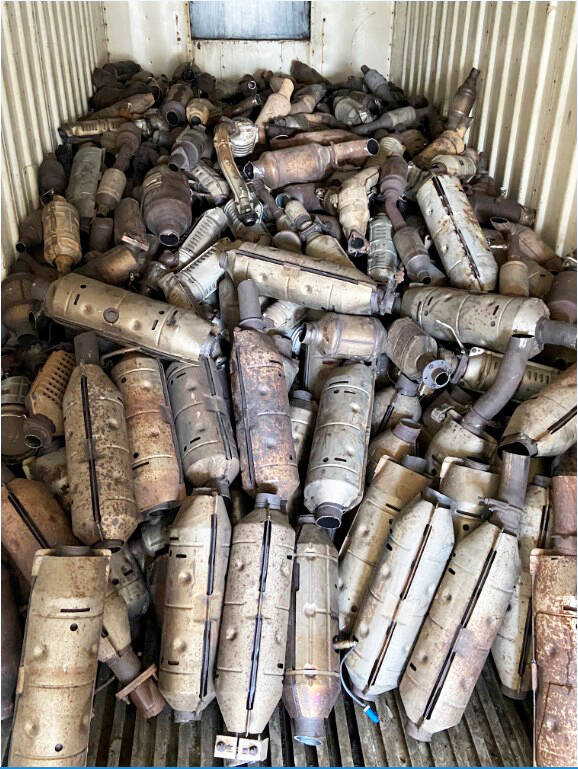A King County senior deputy prosecuting attorney testified virtually Tuesday, Jan. 25 in front of state lawmakers about how Senate Bill 5495 can be strengthened to curb the demand for catalytic converters that are illegally stolen and then sold throughout the state.
After learning information by working closely the past year with a special operations unit to investigate catalytic converter thefts in the region, Senior Deputy Prosecuting Attorney Gary Ernsdorff urged the Senate Law and Justice Committee to consider technical changes to the bill that aim to shrink the marketplace for stolen catalytic converters, according to a King County Prosecuting Attorney’s Office email.
“I’d like to discuss thoughtful regulation,” Ernsdorff said. “Dry up the demand for stolen catalytic converters and you dry up the thefts overnight. I encourage you to act swiftly and surely. A delay to next year’s legislative session only means that thousands, maybe tens of thousands of Washingtonians will be victimized during the delay.”
Ernsdorff laid out a plan for that thoughtful regulation, including: required recordkeeping and inspection, funded enforcement, and sure and swift penalties for recyclers who are not in compliance. He said this plan would decrease demand for illegal catalytic converters and allow law abiding recyclers to continue conducting their legal and profitable businesses.
Ernsdorff said the supply and demand side make for a perfect setting for catalytic converter theft.
“On the supply side, we have low level criminal actors who commit a very quick theft and they can net $500 for one catalytic converter,” he said. “It’s a target rich environment, vehicles are all around us – there’s no entry required so car alarms are ineffective, so this is easy pickings. The only necessary tool is a common Sawzall and we’re seeing those shoplifted everyday at big box stores.”
Ernsdorff said given COVID-19 and other issues, many judges are unlikely to hold these low level offenders for a property crime, so an arrest really is just an inconvenience.
“They are back out on the street later that day or maybe the next day,” he said. “And if a prosecution results under the current sentencing guidelines, sentencing can be a long time away with minimal sentences. So on the supply side, we have big return, and little risk.”
On the demand side, Ernsdorff said this is a big money business because of the precious metals in the converters.
“Recyclers and middlemen make a lot of money off these transactions,” he said. “Last year, I saw a buyer post a photo on Facebook of his brand new Lamborghini, bought with catalytic converter proceeds, and it was his second Lamborghini.”
The prosecuting attorney said the recycling shops are similar to the dirty pawnshops he has investigated.
“The recyclers hide behind the front desk clerk, who is low paid, does the transactions and gives the owners – the people who make the profit – plausible deniability and a straw fall man,” Ernsdorff said.
He said criminal investigations are long and costly, and they have to prove that the recyclers knew the catalytic converters were stolen – and that’s difficult. He added there’s no dedicated funding that he know of to drive a regulatory scheme at this time. He said current regulations, and there are some, are clearly ineffective.
Ernsdorff said the key is to attack the demand side with thoughtful regulation.
Ernsdorff proposed strict record-keeping requirements, including a photocopy of valid identification; multiple photographs of the catalytic converter in order to individualize it; information of the vehicle it came off of; whether or not they are the vehicle’s owner or reseller; and memorializing every other aspect of the transaction.
He also recommended mandatory permissive inspection by an enforcement agency (perhaps the Washington State Patrol), and to require mandatory inspection of paperwork for anyone buying catalytic converters; a significant fine, $2,000; and forfeiture of any catalytic converter not in compliance with the paperwork requirement.
“And, so this is not an unfunded mandate, we need to take a significant portion of those fines and distribute them to an enforcement agency so they have monetary backing to conduct these regulatory investigations,” he said.
“I’d imagine there could be pushback from the industry,” he said. “But law-abiding recyclers are already required to keep some records, and if you can afford a Lamborghini you can afford a couple more minutes onto a transaction that’s going to net you hundreds of dollars.”
Talk to us
Please share your story tips by emailing editor@kentreporter.com.
To share your opinion for publication, submit a letter through our website https://www.kentreporter.com/submit-letter/. Include your name, address and daytime phone number. (We’ll only publish your name and hometown.) Please keep letters to 300 words or less.

